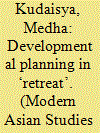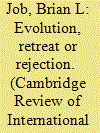|
|
|
Sort Order |
|
|
|
Items / Page
|
|
|
|
|
|
|
| Srl | Item |
| 1 |
ID:
090889


|
|
|
|
|
| Publication |
2009.
|
| Summary/Abstract |
The Commonwealth is short of imaginative leaders after the outstanding generations of Nehru, Trudeau, Nyerere, Lee Kuan Yew, Mandela, and Manley. Yet more than other international bodies it depends on the energy, ideas and personal contact of the people at the top. Democracy is producing a greater turnover of heads of government, but in this hurried world Commonwealth summits are now down to three days and the leaders are not getting enough time to get to know each other face to face in the way that they did in the 1960s, 1970s and 1980s. Between the 2007 summit in Kampala and the 2009 meeting in Port of Spain (27-29 November), 17 new heads of government have taken over. Yet the association is thriving and growing, especially as the work of its civil society organisations grows apace.
|
|
|
|
|
|
|
|
|
|
|
|
|
|
|
|
| 2 |
ID:
139686


|
|
|
|
|
| Summary/Abstract |
This article concerns the history of economic planning in India in the late 1960s, when a vigorous debate took place on the institutions, instruments, and ‘personnel’ of developmental planning. Examining the years from 1967 to 1971, this article shows how dramatic attempts were made by warring politicians with the help of technocrats to decentralize economic planning, grant states more fiscal autonomy, and drastically reduce the powers of the Planning Commission. This article examines how these critical economic initiatives unfolded but were ultimately overshadowed by political power struggles in which the planning process and the Planning Commission became important tools in attempts for centralization.
|
|
|
|
|
|
|
|
|
|
|
|
|
|
|
|
| 3 |
ID:
151305


|
|
|
|
|
| Summary/Abstract |
This paper outlines the development and evolution of the normative positions of China, Brazil and India on issues surrounding the responsibility to protect (R2P) by charting their engagement in the ‘institutionalized conversation’ within the United Nations. In doing so, it seeks to dispel characterizations of these states as having adopted individual or common positions that either wholly reject or accept R2P. The nuances of the adaption and adoption of their postures need to be appreciated. Indeed, of the three component ‘pillars’ of R2P, they find themselves in general accord regarding Pillar One (state responsibility) and Pillar Two (prevention and assistance). It is on Pillar Three (reaction and response) that they diverge from each other and find themselves most at variance with ‘Western’ agendas of intervention and regime change. This divergence is most sharply drawn at present, in light of the Libyan and ongoing Syrian experiences.
|
|
|
|
|
|
|
|
|
|
|
|
|
|
|
|
| 4 |
ID:
149628


|
|
|
|
|
| Summary/Abstract |
The liberal international order [1] has always depended on the idea of progress. Since 1945, Western policymakers have believed that open markets, democracy, and individual human rights would gradually spread across the entire globe. Today, such hopes seem naive.
|
|
|
|
|
|
|
|
|
|
|
|
|
|
|
|
|
|
|
|
|